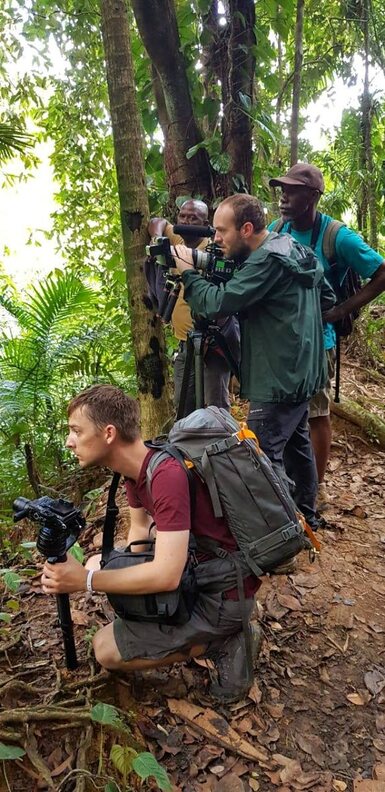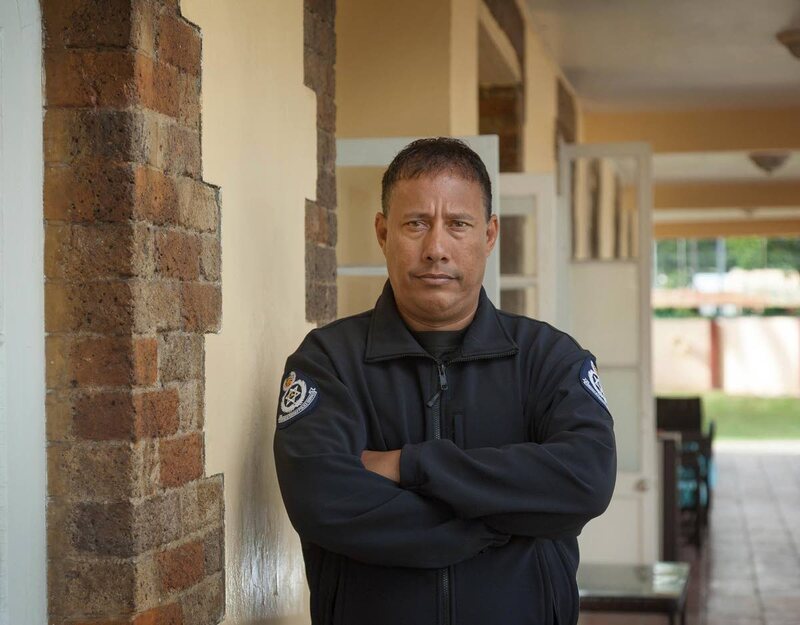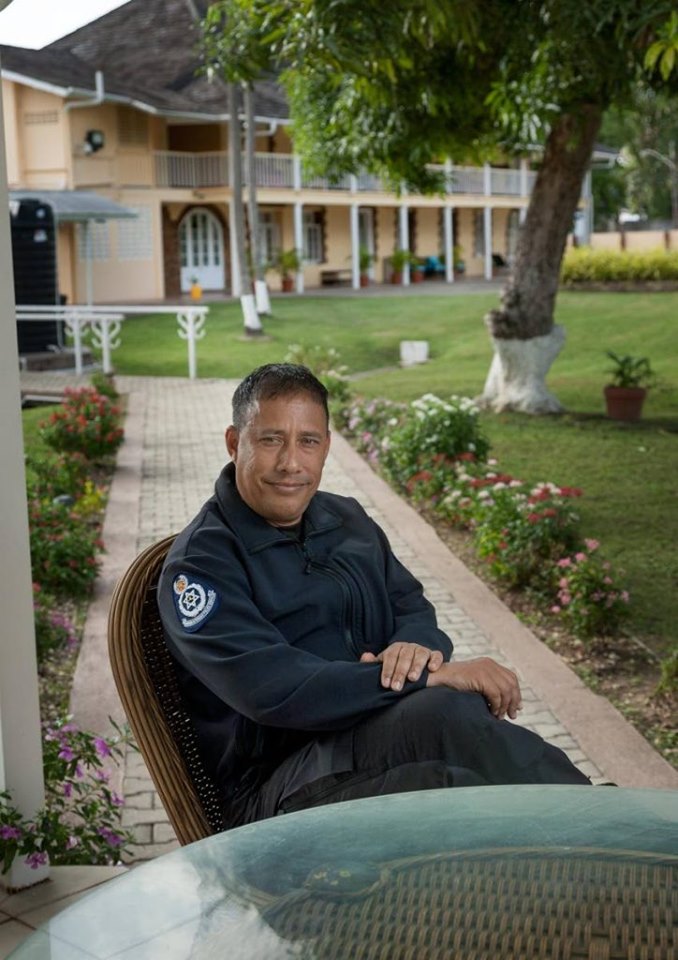|
Four million people have fled Venezuela, as the country continues to face economic and political crisis.
40,000 have gone to the small Caribbean islands of Trinidad and Tobago, just seven miles off the coast. But life isn’t easy for those who arrive, and some locals have made it clear they’re not welcome. The BBC’s Ashley John-Baptiste went to find out more. In 2018 - more than 35,000 people were forced to flee their homes every day - that's one every two seconds. This story is part of a BBC News series, called "The Displaced" - a selection of stories exploring the human impact of this movement, and how it is changing our world. Check back next week, Monday 23rd September, for our next episode in Uganda #TheDisplaced If you have been affected by these issues in Trinidad or anywhere else in the world and would like to speak to the BBC, email [email protected]
0 Comments
AS TOLD TO BC PIRES
My name is Gary Griffith and I am a St Mary’s/Sandhurst old boy and I’m using all the traits I acquired at those two institutions to try to make TT a better country. I spent most of my life as an only child in the very boring Valsayn Park, but I (often) ran away to my grandmother’s massive family in Diego Martin to enjoy things that, unfortunately, many people don’t experience in Trinidad now. Doors were left open and children could walk free.You could go up the hill, pick mangoes, climb over the mountain, come back in the afternoon. Boat-racing in the canal. Now, young persons, inclusive of my son, have to spend their time behind locked doors and in front of some screen. I really didn’t need to become commissioner of police. Both my parents died back-to-back about three months before I became (the United National Congress) national security minister. And they both did pretty well, so I inherited quite a bit. They were divorced for 25-odd years so it looks like they couldn’t live with each other but, apparently, couldn’t live without each other either. My father was an old QRC boy and a true Trini. He loved everyone and everybody loved him. My mother was rigid, meticulous, stringent.I take character traits from both. One day, round the Savannah – I was about 14 – I asked a sno-cone man if he had a valid food badge. I never get cussed so in my life! I realised that day I mustn’t use all the traits of my parents! This country is full of negativity. In England, if Newcastle is being demoted from the Premiership, there will be 80,000 people in the stands for their last game. In TT, as soon as we feel we may not qualify, nobody turns up. That is how we are. Everyone who’s tried to do something for this country – the Brian Laras, the Stern Johns, the Russel Latapys, the Dwight Yorkes, Minshall, Rudder – they’re recognised as role models internationally – but they’re ridiculed at home. The national U-15 football team – little boys just trying to play football – and the country tried to destroy and undermine them. You can criticise it but you must stand firm with your country. Who has more problems now than the United States or the United Kingdom? But how many of them attack their own country? In Africa, all over the world – but, in this country, we attack our own. You may not have voted for a prime minister but he or she still represents YOU! The more you ridicule the prime minister, the more you undermine your own country! I’ve noticed that the people who know very little about any topic are the ones who speak the most. I want to tell people: have faith! Believe! Trust! When it comes to the main problem, crime, people feel the easiest thing to do is to blame the politicians, blame the police. But when you do that, you’re attacking your own. We are not the enemy. Trying to demonise us is not helping. Maybe it’s my military training but I work towards a chain of command of my God, my country and the citizens. If BC Pires tells me that people say I like to pose with guns for pictures, I ask, “Who wants death threats?” I don’t need to advertise. If people say, “Gary Griffith loves the camera,” it shows (their own) ignorance. I am just doing what is required. I see individuals who do that as hypocritical. I don’t go to the media, the media comes to me. So, because of me being accessible, you try to condemn me for it? I have stepped on many toes. There have been 27 death threats on me and my family from criminal elements in my first year as police commissioner. Before me, there wasn’t any death threat on any commissioner probably for years. So it means I’m doing something right. I’ll be turning the screws even harder. So I expect twice as many next year. In total contrast to what people may think, I have the world of respect for (businessman and social activist)] Kirk Waithe, who has attacked me for (what he apparently worries might be the militarisation of the police force). I think he has the interests of the country at heart and is just trying to make sure that checks and balances are in place. Kirk Waithe could be an asset towards my intention to clean up this country. My Sandhurst comrade Raffique Shah has attacked me. But at least I’m using my military training to try to help the country, not to overthrow it. The camouflage matter was blown totally out of proportion. Another unit used camouflage for 22 years. I’m not saying that makes it right, but there was a precedent. One point three million people did not see it as an issue. The five persons who did had access to the media and continued to pump it. In hindsight, if it hurt those five people so much – and one of those people is BC Pires – I could have held it back for a month. I have no problem with people who criticise me in a classy manner. But social media has provided (People’s National Movement) red and (UNC) yellow sycophants with an avenue. People try to call me a puppet – but this puppet stood firm against (the) government (in which he was a Cabinet minister) against (the programme associated with alleged corruption) Life Sport. That probably caused him to get fired. This puppet said state contracts shouldn’t be given to gangs. This puppet was bold enough to clear (controversial parliamentary revelations by now Prime Minister Keith Rowley) E-mailgate and (controversial accusations against then Prime Minister Kamla Persad-Bissessar) Plant-like-substance-gate. So who am I a puppet to? Well, I am a puppet – but to my God. People want change, they want the country to become better – but it mustn’t affect them personally. Don’t come and tell me I can’t drive intoxicated. Why you picking on us? Is because we are the One Per Cent! Why you only arresting us? Is because we are the little black boys! Go after everybody else but don’t harass me, my people, my race, my community. Gangs aren’t even involved in robberies much any more, because they’re getting easy money from the State. If you have two pothounds – and I refer to gang members as pothounds – in fact, I take that back: pothounds are very nice animals – if you give two pothounds two plates of food, they’re good. But if you take away one plate of food, they start attacking one another in the cage! So be it! The majority – almost 90 per cent – of our homicides involve people engaged in questionable activity. As much as the lady in the towel cries, “He was a good boy, police too wicked!” I called gang leaders, “cockroaches” and people were upset, so I wish to apologise: gang leaders are not cockroaches. Because cockroaches will get into your food, but they do not deliberately try to harm you. A gang leader is worse than a cockroach. So I wish to apologise…to the cockroaches! I might lose some fans with this statement, but I have NEVER eaten doubles in my life. One day I’ll try to understand why 20 people would stand up in front a wooden box on Sunday morning with curried channa running down their mouth because they just have to eat two more. I just don’t get it. A Trini is a citizen of the greatest country in the world. Simple as that. What TT means to me is this: I plan to live for my country. But I am prepared to die for it.[PHOTOs BY MARK LYNDERSAY] Source: Newsday TT, August 26, 2019 Prime Minister Dr Keith Rowley has announced that Trinidad and Tobago will assist the Bahamas with soldiers, electricity workers and US$500,000.
The prime minister made the announcement at Thursday's post-Cabinet news conference. Parts of the Bahamas have been decimated by Hurricane Dorian which hit the islands as a powerful Category 5 hurricane, resulting in at least 20 deaths. Dr Rowley told the media that he has been in touch with the prime minister of the Bahamas, Dr Hurbert Minnis and that they have discussed what Trinidad and Tobago could do for the Caribbean Community (Caricom) country. He said 100 members of the Defence Force are now preparing to go to the Bahamas to assist in law and order. With large swaths of the country without electricity, seven technical personnel of the Trinidad and Tobago Electricity Commission (T&TEC) are also being sent to the Bahamas. The prime minister said that the number will be increased once needed. While noting that the Bahamas is receiving "considerable assistance from US and Canada", he said Trinidad and Tobago will also provide monetary assistance to the tune of US$500,000 to assist in paying for some expenses, including medical supplies. Two CARICOM leaders touched down in the Bahamas Thursday morning to hold talks about relief efforts. Barbados Prime Minister Mia Mottley and St Lucian Prime Minister Allen Chastanet arrived at the Lynden Pindling International Airport in Nassau shortly before 9 am. According to Mottley's Facebook page, they were greeted by several Bahamian government ministers, including Minister of Tourism Dionsio D'Aguliar, Minister of Education Jeffery Lloyd and Minister of Transport Renwood Wills among other dignitaries. Both prime ministers were accompanied by CARICOM Secretary-General Irwin La Roque and were later whisked away for a closed-door meeting with Minnis at the National Emergency Management Administration (NEMA) office. The first large relief ship arrived in the northwest Bahamas on Thursday morning, with tugboats ferrying pallets of water bottles, boxes of cereal and 10,000 hot and cold meals from a Royal Caribbean cruise ship to battered Freeport. But with the grim toll still mounting, it was clear a lot more help will be needed for the once lush Grand Bahama and the neighbouring Abaco Islands. Source: Guardian, September 10, 2019  A production team from National Geographic Travellers was left stunned by the wide diversity of the ecosystems in Tobago. During their final day of filming, last Friday, in phase two of a marketing initiative by the Tobago Tourism Agency Ltd (TTAL), the production team expressed amazement that a small island like Tobago housed up to 240 species of birds, 640 species of plants and 160 tree species. They also appreciated how easily accessible the island's ecosystems, popular attractions and historical sites are for locals and visitors. Newsday was told the team, which left on Friday, visited the Argyle, Parlatuvier, and Castara waterfalls. This was the National Geographic's second visit to Tobago. In May, the team began filming a number of popular historical sites along the eastern end of Tobago. The team along with TTAL CEO Louis Lewis, on Thursday, also visited the oldest protected forest reserve in the Western Hemisphere, Tobago's Main Ridge Forest Reserve. Local tour guide William Trim, who assisted the production team, told Newsday, "When we went to the rainforest, we were able to get some lovely birds, both at the rainforest and at the waterfall, and seven to nine other species." Trim said this is not the first time Tobago's ecosystem has been featured globally and he believes this additional exposure will help sell the the island to nature lovers. "It was quite a privilege to be a part of marketing the product. Seems to me National Geographic will be able to push Tobago's beautiful scenery. I am happy TTAL has teamed up with them." National Geographic Travellers was invited by the TTAL as a marketing initiative to highlight Tobago's culture, people, sites, food and popular attractions. During the first phase of the production, several locals were interviewed. The team also captured aerial and underwater footage of some historical and pristine sites. This final content will be featured on National Geographic Traveller's website, their print and digital platforms. TTAL CEO Louis Lewis said this move is strategic in the rebranding of "Destination Tobago." He added, "Tobago, it is integral to create content aligned with our core pillars that illustrate Tobago as the unspoilt, untouched and undiscovered Caribbean island, where one can explore the extraordinary. "We are excited to partner with such an iconic publication with a stellar reputation in travel and tourism, and we look forward to the resulting content that we can share with the rest of the world. Source: Newsday, July 30, 2019  Dr. Alexandra Amon - THE MICHAEL PENSTON THESIS PRIZE 2018 The Michael Penston Thesis Prize 2018 has been awarded to Dr. Alexandra Amon for the thesis entitled ‘‘Cosmology with the Kilo-Degree Lensing Survey.’ Alexandra Amon completed her undergraduate and Ph.D. at the University of Edinburgh with Prof. Catherine Heymans and Prof. Chris Blake, after growing up on the islands of Trinidad and Tobago. Since then, she is a Kavli Fellow at Stanford University/SLAC, USA, as part of Prof. Risa Wechsler’s group. There she spends her time working as part of the Dark Energy Survey’s weak lensing team. WOW!!! This branded cab in London was part of Tobago Tourism's Tobago Beyond campaign. The Tobago Tourism Agency Limited’s destination marketing campaign, “Tobago Beyond”, has been shortlisted in the International Travel & Tourism Awards 2019 in the “Best National Tourism Board Campaign” and “Best Destination Campaign” categories.
A release from TTAL said the International Travel and Tourism Awards is presented by the World Travel Market and supported by the United Nations World Tourism Organisation. The awards are a global platform that recognises and promotes excellence within the travel and tourism industry. The 2019 Awards Ceremony will take place on Tuesday, November 5 in London, England. According to the release, the “Best National Tourism Board Campaign” award recognises which destination showcased its vibrancy, culture, and individuality through a consumer or trade campaign that leaves the viewer pushing the destination to the top of their bucket list, or wanting to return. The award for “Best Destination Campaign” looks at which destination’s campaign achieved volume and value growth in addition to encouraging visitation. TTAL said the submitted campaigns were assessed using tangible metrics, including proof of audience engagement, budget, and obstacles and how they were resolved. According to Nicole Smart, International Travel and Tourism Awards Organiser: “Our judges have been greatly impressed by the exceptional quality of entries, and those who are on the shortlist know they have reached a very high standard – they will be among the best in the world.” Tobago’s submission, “Revitalising Tobago Tourism”, outlined the aim of the “Tobago Beyond” campaign, which is to revitalise the international appeal of Tobago as a real challenger holiday destination for those seeking a Caribbean holiday. With limited resources in comparison to other Caribbean destinations, focusing on specific markets and traveler segments was a key part of the strategy. TTAL said the submission also indicated that all of the campaign’s KPIs (Key Performance Indicators) have outperformed, and resulted in double-digit growth of arrivals in 8 months, with the last three months showing 22 percent, 29 percent and 40 percent growth respectively. Commenting on the announcement of Tobago being shortlisted in the awards, Secretary for Tourism, Culture and Transportation, Councillor Nadine Stewart-Phillips said: “This accomplishment is another reflection of our continued commitment to advance the island's tourism sector. This is certainly a testament to the fact that we are going in the right direction with respect to greater visibility for destination Tobago. "Since the launch, the ‘Tobago Beyond’ campaign has attracted tremendous local and international interest and has yielded substantial results. I am heartened that our efforts are being recognised globally and look forward to the continued positive returns this recognition will bring.” Louis Lewis, CEO of the Tobago Tourism Agency Limited, also expressed his satisfaction with the news, stating: “We are honoured to be shortlisted for not just one, but two categories in these prestigious awards, due to the beyond ordinary marketing efforts of the Tobago Tourism Agency. Our intention has always been to enable Tobago to be a stand out destination in its own right using the island’s unique character and features to guide our creative and messaging exploration, and our recognition in these awards signify that our brand message is being received loud and clear.” Source: Newsday, August 2019 Extra Innings, a period drama produced by Trinidadian born filmmaker Jolene Mendes, won the top award for Best Feature Film at the 2019 Manhattan Film Festival held in Cinema Village, New York in May. The film, set in 1960's Brooklyn, tells the story of an aspiring baseball player who is torn between pursuing his professional dreams and remaining devoted to his religious family who are affected by mental illness. Extra Innings features actors Alex Walton, Aidan P. Brennan, Mara Kassin and Geraldine Singer. It was directed by Albert Dabah and Brian Dillinger from an original script written by Dabah, and is based on his own life story. Mendes produced the film with Rabia Sultana. The award represents the highest accolade to date won by Mendes, a graduate of the film production conservatory programme at the New York Film Academy, who marks her feature film producing debut with the film. Several of her previously produced short films have screened at festivals around the world, winning awards at the Soho Film Festival, the New York City International Film Festival, the Coney Island Film Festival and the Orlando Film Festival. According to Mendes "This award has special meaning for us all, as the project was a labor of love in every way. We didn't have a big budget, but we had a story with a big heart, so generously shared with us by Albert. In a festival that screens nearly 200 films annually, for our film to win the most prestigious award meant everything." Mendes has had a passion for and curiosity about film and television production since her childhood in her native country Trinidad. But since the island did not have a thriving film industry at the time, she never thought a career in film was possible. Following her graduation from high school, she studied briefly in Canada before switching career paths, relocating to New York and enrolling at NYFA to pursue her dream of film production. Since graduating from the conservatory programme in 2015, she has been working steadily as a film producer, making it her mission to make films that have the potential to "inspire and make a difference in the world." "I feel so lucky to have been given the opportunity to make my passion into my career. What I love most about film is the ability it has to have such a huge impact throughout the world. The fact that you can sit down for a couple hours and laugh, cry, be motivated or feel inspired is so special to me. For all these reasons, the journey we have taken with Extra Innings has been truly unforgettable. It has some wonderful things to say about ambition, family and making hard choices. It also tackles the sensitive issue of mental illness in a very real and relatable way. Everyone who sees it can learn something from this film." Source: BroadwayWorld.com  The Washington-based Institute for Caribbean Studies (ICS) has inducted four-time Olympic medallist Ato Boldon into its Wall of Fame. The honour was given as part of the Institute's efforts to pay tribute to notable Caribbean nationals during Caribbean American Heritage Month, held annually in June. Boldon holds the Trinidad and Tobago national record in the 50, 60 and 200-metre events, with times of 5.64, 6.49 and 19.77 seconds respectively, and also the Commonwealth Games record in the 100m. The ICS said, “Boldon is widely viewed as one of the all-time leading sportsmen in the history of the Caribbean, as well as one of its most internationally-recognisable spokesman.” After he retired from the track, he made his NBC Sports Group debut in 2007 during NBC’s presentation of the US National Championships. That same year, Boldon also served as an analyst for NBC’s coverage of the Track and Field World Championships. NBC said Boldon joined its Olympics broadcasting team in 2008 where he served as a track and field analyst for NBC’s coverage of the Beijing Olympic Games. He continued in that role during the 2012 London Olympic Games and most recently, he served as an Olympic correspondent at the 2018 Olympic Winter Games in Pyeongchang. Prior to joining NBC Sports Group, Boldon served as an analyst for BBC’s coverage of the 1999 World Championships in Seville, Spain. Source: The Loop, June 2019  A STREET in San Fernando has been named after a former slave Mary Belgrove, who first established a funeral parlour in the city in 1888. The former Henry Street, which stands on the side of Belgrove’s Funeral Home and Crematorium on Coffee Street, was renamed Belgrove Lane recently in honour of the family’s long contribution to the commerce of the city This is the sixth street named after individuals who have contributed to the development of San Fernando in the past year, through the initiative of San Fernando mayor Junia Regrello. At the street naming ceremony Regrello noted that many of the streets in the city were named after past governors, mayors and politicians. He said there were other individual worthy of such a gesture and established a committee to research and make recommendations. CEO of the Belgroves Group of Companies Keith Belgrove welcomed the renaming of the street to honour his family’s legacy, As the ceremony, Belgrove proposed that the University of the West Indies, (UWI) St Augustine campus take the first step in starting an associate degree programme in funeral services in an attempt to raise the bar. “We cannot truly become a professional service unless we raise the education bar. I am going to talk to the UWI to put an associate degree together to raise the bar in funeral service. “It is already in Jamaica,” Belgrove said at a street naming ceremony in San Fernando yesterday. Belgrove also used the opportunity to call on Attorney General Faris Al Rawi and Local Government Minister Kazim Hosein to fulfil his dream and regulate the funeral industry. “I dream of the day in my lifetime when funeral directors can grow from being an industry to truly being a profession. “We will not get there unless regulations for the funeral industry is enacted.” Before an audience which included Regrello and deputy mayor Vidya Mungal- Bissessar, Belgrove said he has been clamouring for regulations since the 1990’s. He said Patrick Manning first took the proposal to Cabinet when he was alive and was prime minister but since then he has had promises from successive governments but no results. “The AG gave me promises. The Minister of Local Government gave me promises. I know you have a lot on your plate as you point out constantly but push it. This is a good time to make it happen.” Belgrove also issued a call for the reduction in the “punitive” tariff rates funeral homes are subjected to in the importation of hearses which he said has led to a high cost to the consumer. He said three months ago he wrote to the Comptroller of Customs and Excise to consider its application for the correction for the rate of import duty on funeral hearses. “It is now three months and we have not had any productive response. How can we grow our business under such punitive import duty rates of 65.5 per cent?” he asked. Belgrove said his company has professionally pointed out that funeral hearses are considered special purpose goods vehicle. “To the motor vehicle taxes, it is so considered, but for duty it is considered a luxury vehicle. “There are so many funeral homes who cannot afford to bring professional vehicles in this country. “How then can we stand up as truly world class?” Source: Newsday, June 27, 2019 From the Trinidad & Tobago Guardian, July 24, 2019
We've known for some time now that Trinidad and Tobago was a country spiralling out of control. People were being killed and robbed at record rates, weapons made for war flooded our streets and everyone seemed to be living in fear of losing their life. If you think our national nightmare couldn't get worse, just reflect on the events of the last few weeks. In broad daylight, there were deadly gun battles in the streets of Port-of-Spain at least 24 people in different parts of the country were killed last week alone. No place seemed safe from the scourge of violent crime—from an evening jaunt for fried chicken in Westmoorings to a children's birthday party in central Trinidad. From the time you step out of your door, you're taking your life in your own hands. Only two days ago, a businessman getting ready to drop his wife off to work was shot dead in a drive-by shooting. Criminal gangs have gotten more brazen. They respect no one. Mothers and children are often collateral damage, caught in the crossfire of bloody gang wars. Senior citizens are being targeted and killed by armed home invaders. The spike in rapes of women is now attributed to roaming bands of serial rapists. Some crime scenes in our country resemble the world's deadliest war zones. We are well past the point of patience and tolerance. We do not have the luxury of time. We demand urgent and immediate action. The leaders of our government and opposition parties have failed to deliver. They need to set aside their differences and confront our national crisis head-on. 1. It starts at the top. That means you, Prime Minister Rowley. When you campaigned for office five years ago, you predicted that out-of-control crime would topple the UNC-led government. Appealing for support at the polls, you told us that we were "virtually voting to save (our) life." Voters put their trust in you. Our lives have never been in greater danger. The first and utmost responsibility of any government is to protect its citizens and provide safety of law and order. On that score, your government gets an F. Crime has soared since you took office, surpassing by far the dubious records of your political rivals, whom you appropriately lambasted for their own failings in fighting crime. When Barack Obama became president of the United States in 2008, he quickly accepted the role of consoler-in-chief to comfort his nation after mass shootings and other periods of national grief. In our nation, there is a deafening silence from the top when mothers wail after the blood of their children flows in the street. We can do better. Ask random people in Trinidad and Tobago to list close family members and loved ones who have been murdered in the last decade and it is not unusual for the number to exceed 20. You, Dr Rowley, have felt your own visceral agony of losing loved ones to crime. In early May, your former high school classmate John "Joker" Mills and his common-law wife, Eulyn John, were brutally killed by an intruder in the bedroom of their Tobago home. Their hands and feet were bound, their mouths gagged and multiple stab wounds covered their bodies. In your Facebook post, you asked: "What have we become? What are we producing as the next generation?" As head of government, you can help save our next generation, Dr Rowley. Even though it took three years for you to install permanent leadership in the police service, it was only a start. The lion's share of the work is yet to be done. One of the first tasks should be ensuring that police have all the tools to do their job. It didn't help that Guardian Media reports recently disclosed that our government used millions of dollars in taxpayers' money to support gang bosses and criminal networks fuelling crime. It is indisputable that these criminals take our money, buy bigger and more menacing guns, fund their illicit activities, then fight each other for the government largesse. Many civilians become their innocent robbery and murder victims. (The UNC-led government does not have clean hands in this matter, as it has also funded "community leaders", also known as gang bosses). But now, Dr Rowley, your wear the jacket. How can the commissioner and his rank-and-file do their jobs when your government is funding the gangs? Don't take our word for it. Listen to what Police Commissioner Gary Griffith said last week: "It is absolute madness that anybody that holds a position of authority could feel that by giving criminal elements funds and money…. [then] throw blame on the police service. I will not have anyone throw blame…when they are not doing their job." This is the time, Dr Rowley, for you to stand up and make bold decisions for all the people of Trinidad and Tobago. One should not ponder if starving the criminal networks of taxpayers' money will result in electoral consequences. Here's another way you can make a difference, Dr Rowley. Undertake a massive restructuring of the nation's legal system. In the PNM's 2015 manifesto, you promised: "The PNM will engage the criminal justice system stakeholders to re-engineer the structure to provide an efficient and legitimate criminal justice system as the foundation for crime prevention, law enforcement and the protection of human rights." Everyone agrees that our justice system needs a massive overhaul. Criminal cases still take up to 15 years to come to trial—with no guarantee of resolution. (One fraud case involving a lawyer who tampered with witnesses ended last week after 24 years.) Many cases languish before magistrates and judges, some of whom, for various reasons, lack any urgency to clear their dockets. The judiciary owns part of the crime problem. If you cannot have a fair justice system, you cannot fairly prosecute criminals responsible for the crime spree. Dr Rowley, the question is: do you have the will to fulfil your promise? Many people—eminent legal scholars and citizens alike—were dismayed last week when you decided to leave Chief Justice Ivor Archie in his job. He faced misconduct allegations involving his association with two convicted fraudsters. Over the last few years, his colleagues on the bench, the legal community and the public have lost confidence in Archie and, by extension, the administration of justice. If Archie appears to be compromised, how could he be expected to help you transform the justice system? Fighting crime should be the Government's top priority. That is why we cannot understand how Stuart Young, your hardest working minister in government business, can be minister of communication, minister of legal affairs, minister in the Office of the Prime Minister and minister of national security. No wonder, the overburdened Mr Young sometimes takes a hands-off approach when pressed on crime. "At the end of the day the Commissioner of Police and the men and women of the Police Service are the ones constitutionally who have the powers of arrest. I can't go and arrest anyone," he said in a recent rebuttal. Attacking our national crisis is a full-time job. Here's a radical proposal: reduce Mr Young's portfolio to only minister of national security or appoint someone who can focus every minute of the day on our national crisis. 2. Fellow citizens of Trinidad and Tobago, the heinous nature and frequency of the crime you see everyday is not normal. We are losing a generation of young men—and young women. If you follow social media sites covering our carnage, you'll receive a daily blast of drive-by killings, robberies and vicious fights—often with guns, cutlasses and anything people can get their hands on. In other videos, women and children confront and even repel police who enter neighbourhoods to arrest suspected gangsters. This is not normal. The criminals keep getting younger and younger. With the glee of children playing video games, a group of boys who seemed no older than ten-years-old brandished guns and bragged in a recent video about their criminal and sexual exploits. No wonder that many people, after seeing or hearing about grotesque crime, say in exasperation: "Trinidad is not a real place." Last week came another shocker: young women flashing big grins and what appeared to be semi-automatic weapons. Many of our young people have lost their innocence. It is no surprise that in many schools, teachers are no longer in charge and discipline holds no sway. Some youngsters have little or no regard for authority because they feel that kind of behaviour is empowering and has currency. It seems like every day the lives of our nation's youths are being snuffed out as killers show no mercy. We all remember how 13-year-old Videsh Subar, while awaiting his SEA result, was brutally murdered. The schoolboy and his neighbour, in whose care he was left, were found in her Malabar home tied up and their throats slashed. In Laventille, where violent gang wars reflect the horrors of urban warfare, children are often innocent victims. About two weeks ago, Fitzgerald Hinds, minister in the Office of the Attorney General, disclosed that in the last decade, more than 1,300 people in Laventille alone had been murdered, some 93 per cent by gunfire. Hear Mr Hinds: "We have a crisis in Laventille. Because you know better than me that tomorrow, this evening, your children are at risk. They could be in the wrong place at the wrong time. And you know you too are at risk. Because if you only provoke somebody now, tell them something, watch them too hard, bounce them as you passing by the shop, they want to go for their 'lass, they want to go for their gun. That is the level of ignorance." Hinds seemed baffled that children in Laventille would suffer the same dire plight of children in Middle Eastern conflicts. "This is no war zone," he said of Laventille. When you hear despair in a government minister's voice, you know we're in trouble. 3. This is a call to all decent people. All the good citizens of Trinidad and Tobago who value law and order over lawlessness must come forward in numbers greater than the criminals to reclaim our country, to help make our neighbourhoods safe again and work with what should be a revamped and professional police service. Let us channel our collective outrage over two decades of record-setting bloodletting to let our leaders know that we don't like it so. Demand that they work together to solve the crisis. We need to develop and rally around a well-articulated national crime prevention strategy. The Government and Opposition should embrace civil society groups and the business community to develop this plan, with appropriate contributions from people across the nation. Before that happens, the Government should be honest and transparent about the scope of the problem. But first, the Government and the police should consider taking interim steps to restore public trust in the police and judiciary. We must acknowledge that recent examples of people who have stood stood up against criminals haven't gone so well. Just ponder how many state witnesses have been killed while they were in protective custody. Commissioner Gary Griffith would acknowledge that many corrupt cops would disclose the names of informants to criminals. Griffith needs to be given the tools to clean up rogue elements to build confidence in police service. Any effort to address crime must confront the toughest questions. For instance, if the murder toll in Trinidad and Tobago is largely fuelled by turf battles over drugs, is it time for a wholesale review of our existing drug laws? How do we prevent weapons of war from entering the country through our ports? How do we provide jobs—in the public and private sectors—and hope to impoverished communities? And how do we rally the nation to become part of the solution? Guardian Media remains committed to addressing these pressing issues. In the next few weeks, we will show how our dire crime situation is ripping apart the fabric of our nation—and what we all need to do to be safer in our homes, our neighbourhoods and our country. To channel Stalin, the bard from Marabella: Our country faces its darkest hour. This is a time to demand that our leaders put country before party. Finding solutions will not be easy. They will require our best minds, sacrifice and collaboration to ensure that Trinidad and Tobago does not become a failed state. Staying the course or doing nothing is not an option. Our beloved nation's very survival is at stake. |
T&T news blogThe intent of this blog is to bring some news from home and other fun items. If you enjoy what you read, please leave us a comment.. Archives
July 2025
Categories
All
|





 RSS Feed
RSS Feed